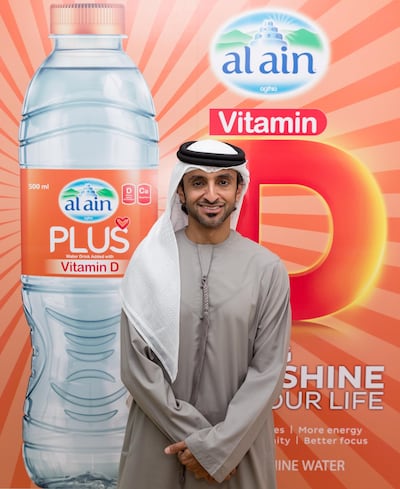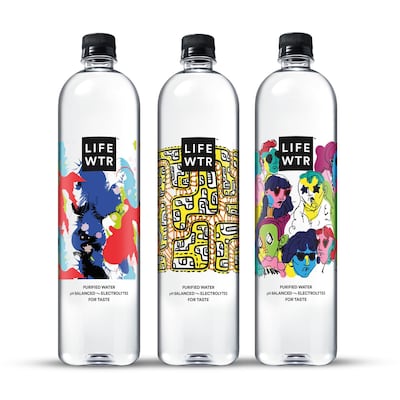Each morning, the thousands of motorists travelling on Sheikh Zayed Road in Dubai are greeted by a 50-foot-long portrait of a smiling Jennifer Aniston. She’s lying there, on the side of the E11, to promote water – and not just any old water. The actress is the face of Smartwater, Coca-Cola’s answer to a growing trend that appears to be telling consumers that normal water just isn’t enough anymore.
We all know the health benefits of water. It keeps our energy levels up, our skin looking healthy and, when it comes down to it, it keeps us alive. But increasingly, water in its basic form is being taken and pumped full of protein or hydrogen or electrolytes, all said to give us extra health benefits. But is there a science to it, or is it all just a marketing gimmick?
Smartwater by Coca-Cola
"Inspired by the clouds, Smartwater is the first-ever bottled water brand to use a unique method of vapour distillation, a process that simulates the way water is purified in nature, and it features added minerals and electrolytes for a clean, crisp taste," explains Juan Carlos Mallet, marketing director for the Middle East at The Coca-Cola Company.
It sounds impressive on the face of it but, as a consumer, trying to establish the actual health benefits of these added electrolytes without a biology degree can be challenging. “With water making up more than 60 per cent of the human body, staying hydrated is a key part of staying healthy and maintaining the function of every system in your body, including your heart, brain and muscles,” Mallet explains. “Drinking two litres of Smartwater daily provides all the benefits of water such as maximising physical performance. It also contributes to the maintenance of normal physical and cognitive functions, and normal regulation of the body’s temperature.” The electrolytes, he says, are all about the taste.
For a company that achieved global domination by selling one of the most sugar-heavy drinks, this move into fortified water seems ironic. Obviously, through Smartwater, Coca-Cola is trying to keep up with an increasingly health-conscious market – and it's not alone.
“It is highly competitive and innovation has truly reconfigured this sector. To stand out among the competition, it is imperative to establish a strong brand image and point of differentiation,” Mallet admits.
“Today’s consumers are looking for a product that offers more than just regular refreshment and the increase in health-consciousness is driving the demand for functional water with added value in the form of minerals, oxygen and vitamins. Consumers are also becoming more environmentally conscious and want to support a more sustainable lifestyle, which has led to a growing trend of innovative packaging.”
PepsiCo and Lucozade are among the other big-name brands to launch enhanced waters, rivalling dozens of smaller stand-alone companies already succeeding in the market. With water now the fastest growing segment of the whole beverage industry, it’s easy to see why everyone wants in.
Making a statement with water
PepsiCo’s newest launch, Lifewtr, is pH-balanced, which is meant to keep the body in an alkaline state, and comes with added electrolytes that, again, are said to enhance the taste. But it’s the design of the bottle that the company is really using as its selling point.
“We understood that people, firstly, wanted to hydrate with something healthy, like water. So it’s a category that is important,” says Mauro Porcini, chief design officer of PepsiCo. “But then, a lot of people will walk the streets holding their bottle of water. So there is a symbolic value there. You’re all dressed up in an outfit that you really love. And your water almost becomes a fashion accessory.”
The custom-created labels are all designed by emerging artists, each focusing on a different theme. "The second collection was based around women in art, so three female artists created designs for our bottles, and we've been supporting them in a variety of ways," Porcini says. "Another collection featured fashion designers, specifically ones who work on pattern and graphics."
But do people really buy into this? In PepsiCo's case, it seems so. The product has been very well received, and has boosted business for the company. Porcini says: "It's producing a lot of business results. And it's rare, at this level and on this scale, that a purely design-driven proposition creates so much business value.
Water with vitamin D
In the UAE, the world's only vitamin D-infused water launched earlier this year. Despite the year-round sunshine, 78 per cent of people living in the country suffer from a vitamin D deficiency, and Agthia's water is designed to boost intake.
“We have closely studied vitamin D deficiency, an issue that remains a key health concern in the Middle East, and developed Al Ain Vitamin D, a product that not only hydrates, but also supplements a portion of the daily intake of vitamin D,” says Tariq Ahmed Al Wahedi, chief executive of Agthia.
The water is said to contain 50 IU of the recommended 600 IU daily allowance of vitamin D per 500ml, and is part of the knowledge and innovation priorities for the UAE Vision 2021 agenda.

No substitute for healthy food
Drinking two litres of water each day is something that is drilled into us from a young age. And it’s undoubtedly a good thing that consumer patterns are moving away from sugary juices and carbonated drinks, but with many of these fortified waters retailing for significantly more than regular bottled water and, more to the point, with many of us being able to access bottled water for less or filtered water for free, should we be spending our money?
Dr Mitesh Patel, medical director at Aetna International, a global expat health provider, says: “My feeling is [these waters] are a good way to consume these additional vitamins if you are not already receiving adequate amounts as part of your diet. However, this is no substitute to consuming a balanced diet, which has numerous other benefits in addition to the vitamins you receive.
“The body can only absorb a certain amount of vitamins B and C for example. Any extra above the daily requirement will simply be excreted in the urine so will be of no additional benefit. Also, if you are already consuming a balanced diet, then these vitamin drinks will be of no real benefit.”
Similarly, eating a more alkaline diet (with leafy greens, sweet potato, hazelnuts, melons and berries) can help keep acidity at bay, although healthy adults have a balanced pH regardless of food, or indeed water.
_______________
Read more:
New Dubai abaya lets Vitamin D in
The vitamins you need: what they are, where to get them, and how much to take
Vitamin D: why we don't get enough in the UAE
_______________



